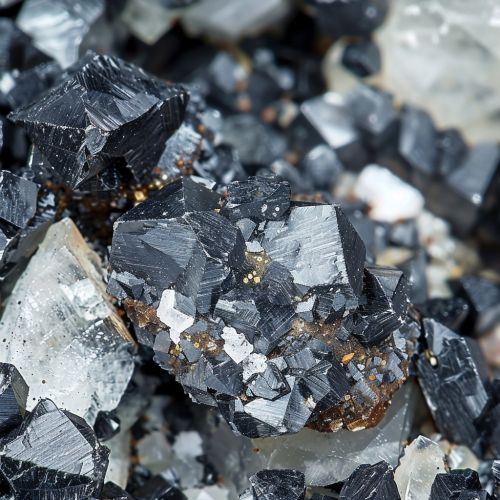Sulfide minerals
Introduction
Sulfide minerals are a class of minerals that contain sulfide (S²⁻) as the major anion. They form one of the most important groups of ore minerals, being responsible for the economic extraction of a variety of metals including copper, lead, zinc, nickel, cobalt, molybdenum, rhenium, and platinum. Sulfide minerals are also significant in the field of geochemistry, as they provide valuable information about the conditions under which they formed.


Classification
Sulfide minerals can be classified based on their composition and structure. There are simple sulfides, which are composed of one metal combined with sulfur, and complex sulfides, which contain more than one metal ion. In addition, there are sulfosalts, which are complex sulfides that also contain a semi-metal such as arsenic, antimony, or bismuth.
Simple Sulfides
Simple sulfides include minerals such as galena (PbS), sphalerite (ZnS), and chalcopyrite (CuFeS₂). These minerals are often found in hydrothermal vein deposits, where they are associated with quartz and other minerals.
Complex Sulfides
Complex sulfides include minerals such as pentlandite ((Ni,Fe)₉S₈) and chalcocite (Cu₂S). These minerals are often found in massive sulfide deposits, which are large accumulations of sulfide minerals that form at the seafloor around hydrothermal vents.
Sulfosalts
Sulfosalts are a group of complex sulfide minerals that contain a semi-metal such as arsenic, antimony, or bismuth. Examples of sulfosalts include tennantite (Cu₁₂As₄S₁₃) and enargite (Cu₃AsS₄). These minerals are often found in high-temperature hydrothermal vein deposits.
Formation and Occurrence
Sulfide minerals form under a variety of geological conditions, including high-temperature hydrothermal systems, volcanic systems, and sedimentary environments. They are often associated with other types of minerals, such as quartz, carbonates, and silicates.
Economic Importance
Sulfide minerals are of great economic importance, as they are the primary source of many metals. They are mined and processed to extract the metal content, which is used in a wide range of applications, from construction and manufacturing to electronics and renewable energy technologies.
Environmental Impact
While sulfide minerals are economically important, their extraction and processing can have significant environmental impacts. When exposed to air and water, sulfide minerals can oxidize and produce acid mine drainage, which can contaminate water bodies and harm aquatic life.
